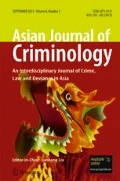The transnational character of organized crime has become a concern for policy makers. It is also a controversial topic of academic debates. While some authors believe that organized crime groups have developed as criminal multinational corporations, and they can go to any places in which easy money can be made, others claim that these organizations have structural deficiencies and they are unable to play a major role in transnational illegal activities. Varese’s new book is a timely work to study mafia transplantation from a new perspective.
Varese’s central question is why in some cases mafia transplantation succeeded while in others it failed. Varese uses both successful and unsuccessful cases to support his argument. The successful cases are Sicilian mafia in New York, ‘Ndrangheta in Bardonecchia in northern Italy, and Russian mafia in Hungary. The failed cases include Sicilian mafia in Argentina, ‘Ndrangheta in Verona in northern Italy, Russian mafia in Rome, and triad societies from Taiwan and Hong Kong in China.
Varese finds that most mafiosi were forced to move abroad by court orders, to escape justice or mafia infighting and wars. But once in the new territory, they started investing in the local economy. When investments combine with a supply of mafiosi and a specific demand for protection services, a group can become entrenched. Varese’s research findings significantly challenge the popular belief that mafia is a giant criminal organization with a Godfather at the top directing his overseas branches to commit a variety of organized crime.
Based on his findings, Varese develops his property rights theory of mafia emergence to explain how mafias might emerge in times of rapid but flawed transitions to the market economy. A sudden boom in a local market that is not governed by the state can lead to a demand for criminal protection. The presence of a supply of people trained in violence and capable of offering such protection might lead to the emergence of a mafia or the transplantation of a foreign group. His theory gives fresh insights into the academic debate on mafia transplantation from a market analysis of private protection.
Varese refers “mafia” to a specific type of criminal organization. It is a group that supplies protection in the territory of origin. Therefore, established criminal organizations in Russia and triad societies in Hong Kong are all “mafia”. I do not think this is a problem because we do need a common name to analyze the transplantation of organized crime groups. Nevertheless, readers should be reminded that, in reality, Italian mafias are different from Russian criminal organizations and Hong Kong triads. In fact, all the Taiwanese crime groups mentioned in the book are not triad societies. It is true that their members have gone through an initiation ceremony, but it is not a triad initiation ritual.
In the case of China, I think Varese rightly points out that corrupt elements of the state apparatus, such as the military, police, and the local administration, act as the protectors of both legitimate business people and illegal entrepreneurs. Local criminal gangs or criminal organizations from Hong Kong and Taiwan are not powerful enough to take on the role of protective umbrellas.
I would further downplay the role of imported Hong Kong triads and Taiwanese criminal organizations as protectors in China. In many cases, it is individual members who take the initiative to enter the Chinese market. Their purposes vary, but establishing their power base to supply criminal protection is not their consideration. Once they are in China, they always keep their membership very low key. Sometimes, they may get involved in settling disputes in the Hong Kong or Taiwanese business communities. Nevertheless, they cannot help out without the collaboration of corrupt government officials and local gangsters.
All in all, this is an excellent academic work in both theoretical and empirical exploration of mafia transplantation. I have no doubt that Varese’s book will make a major contribution to our knowledge of the transnational nature of organized crime groups, especially the possible ways they move.
Yiu Kong Chu
Honorary Assistant Professor
Department of Sociology
The University of Hong Kong
Hong Kong
Open Access
This article is distributed under the terms of the Creative Commons Attribution License which permits any use, distribution, and reproduction in any medium, provided the original author(s) and the source are credited.
Author information
Authors and Affiliations
Corresponding author
Rights and permissions
Open Access This article is distributed under the terms of the Creative Commons Attribution 2.0 International License (https://creativecommons.org/licenses/by/2.0), which permits unrestricted use, distribution, and reproduction in any medium, provided the original work is properly cited.
About this article
Cite this article
Chu, Y.K. Review of Varese, F., Mafias on the Move: How Organized Crime Conquers New Territories . Asian Criminology 8, 225–226 (2013). https://doi.org/10.1007/s11417-012-9142-2
Received:
Accepted:
Published:
Issue Date:
DOI: https://doi.org/10.1007/s11417-012-9142-2

